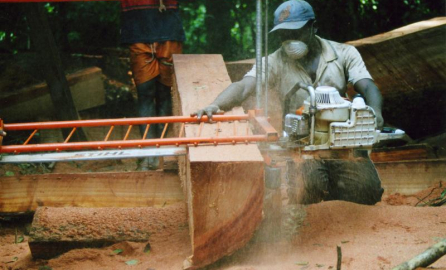At the annual EU Forest Law Enforcement, Governance and Trade (FLEGT) week in Brussels, attendees discussed new agreements that could provide guarantees that timber entering the European Union is legally sourced, protecting environments and increasing revenues for many tropical region countries.
Illegal logging refers to trees felled in contravention of the laws of the country of harvest. It not only robs national governments of valuable tax and export revenues, but can have disastrous environmental impacts, disempower communities, fuel conflicts and feed corruption.
The EU developed in 2003 the FLEGT Action Plan, targeting 60% of the world’s forest and supplying a large proportion of the world’s internationally traded timber. A key element of the FLEGT Action Plan is the Voluntary Partnership Agreement, or VPA. This ensures that only legally harvested timber is imported into the EU from countries agreeing to take part in the scheme.
With over 200 participants from all over the world, the EU Forest Law Enforcement, Governance and Trade (FLEGT) Week in May lauded the progress made on VPAs with the signing in 2011 of two new agreements with Liberia and the Central African Republic, the conclusion of the VPA negotiation with Indonesia, and the forthcoming opening of negotiations with three countries: Guyana, Honduras and Laos.
Participants also discussed the challenges of implementation, regional specific challenges, and agreed on the need to see FLEGT licensed timber in the near future.
A FLEGT Voluntary Partnership Agreement is a legally binding agreement between the European Union and a timber producing country aiming at stopping illegal logging and associated trade. All timber from the partner country is verified as fully legally compliant through a legality assurance system established through a multi-stakeholder process that clarifies what is legal timber, procedures for legality verification, a tracking system, emission of FLEGT licenses and an independent audit.
Voluntary Partnership Agreements have four phases:
1. Preparation, during which countries explore the scope of the partnership model and assess whether it meets the needs of their forest sectors
2. Negotiation, during which the partners agree on the standards and assurance systems on which they will base their timber trade agreement
3. Implementation, during which the parties develop the systems as agreed and assess their credibility
4. Full operation of the system, during which the system are functional and only FLEGT licensed timber can be exported from the partner country to the European market
There are now six countries that have concluded VPA negotiations (Ghana, Congo, Cameroon, Central African Republic, Liberia and Indonesia), while four others are negotiating (Malaysia, Gabon, Democratic Republic of Congo, Vietnam) and three are to open negotiations (Guyana, Honduras and Laos). First FLEGT licensed timber, from a fully operational system, is expected for 2013.
With partner countries now in or approaching implementation phase, it is being seen that the success of a VPA is not only in protecting forests from illegal logging, but in a variety of other areas leading to improved forest governance. For instance, a VPA also encourages the development of responsible civil society and provides a forum for a variety of stakeholders to discuss sensitive issues.
“The FLEGT Action Plan has different elements, the VPA process is only one, but we think it is the most important element to really improve forest governance in these countries,” said Saskia Ozinga, of FERN – The EU Forest Campaign. “Illegal logging is a symptom of something else and these symptoms need to be addressed. These include bad governance, corruption, lack of clear tenure rights of local communities, lack of a pro-active effective civil society and independent media, etc.”
FERN approaches these problems by working with local organisations in tropical forest countries to improve forest governance by strengthening capacity, informing them of EU actions and advising the EU of the civil society organisation’s (CSO’s) position. “And we make sure they have a seat at the table at negotiations, and this is pretty revolutionary,” continued Ms Ozinga. “Every single VPA has been negotiated and adopted with the full consent and full participation of local civil society actors and in some cases communities, and these are legally binding trade agreements – this has not happened before.”
With experience of working with the FLEGT VPA in Indonesia, Faith Doherty of the Environmental Investigation Agency also cites the role of civil society as crucial to the process. “First of all civil society knows their forest better than anybody sitting in an office in Jakarta; secondly, they have attachments to it because it is their livelihood and without those forests they would end up being poor,” she said. “The process of achieving a VPA in Indonesia educated a lot of people about the links between forests and poverty and that has been a great thing that the VPA has done.”
Another watchdog organisation, Transparency International is working on an EU funded project that investigates corruption issues in the timber trade. Manoj Nadkarni, Programme Manager with the Forest Governance Integrity Programme, believes that one of the major outcomes of working with the FLEGT VPA process is that corruption is now openly addressed on the agenda. “Our best step is having people that would earlier be frightened to talk about corruption are now willing to talk and explore options and look at solutions.”
Preparing the European marketplace for preference on legally logged timber is part of another European Commission funded projected relating to FLEGT. The Timber Trade Action Plan (TTAP) is managed by TFT and since 2005 has worked with project partners in the UK, Belgian and Netherlands Timber Trade Federations. Project Manager Alistair Herd explained that the project prepares the members of these federations, who are the importers and buyers of timber in Europe, for the European Timber Regulation which is part of FLEGT.
TTAP is active in ten key producing and processing countries supplying Europe with timber products, and the project works with companies to prepare them for legality verification. Through practical on- the- ground assistance the project helps to build capacity and improve the management of forests, sawmills and factories in the focus countries to meet the requirements of third party legality standards as well as legality assurance schemes, which are part of the VPA negotiations.
“The main impact of the project is awareness raising about FLEGT within the private sector in Europe and producing countries, and what companies are required to do to maintain market access,” he said. “Through robust chain of custody control from forest to export, our work has helped transform the sourcing decisions and supply chain management of timber companies providing assurances to buyers in Europe that their timber and timber products have been legally harvested and produced.”
This is an important point for Denis Koulagna, Secretary General of the Ministry of Forests and Fauna in Cameroon, who signed a VPA in October 2010. “With FLEGT we saw the opportunity to bridge the gap between sustainable forestry management and trade,” he said. “Now, we’re really keen to see how the European Union, at the level of each country, will implement the VPA. The discussion and negotiation was complex and we hope that in the implementation... there are structures because in the end we need to have a frank trade between our country and the European Union”.
For further information and discussion, and to see full length video interviews with FLEGT participants, please visit the capacity4dev.eu Public Group on FLEGT – Forest Law Enforcement, Governance and Trade.
This collaborative piece was drafted with input from Mathieu Bousquet, David Sanmiguel Esteban, Saskia Ozinga, Faith Doherty, Alistair Herd and Valerie Cuvellier with support from the capacity4dev.eu Coordination Team.


Log in with your EU Login account to post or comment on the platform.